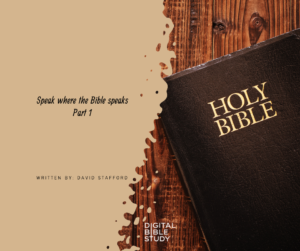Jonathan Jenkins
“The Bible is its own best commentary.” I was taught by a professor for whom that was an oft-repeated truth. The Bible is usually quite consistent its use of language and careful in the way it defines its words. When we take the time to examine how the Bible uses terms, we will discover their true meaning in the text.
This truth is powerful in learning the meaning of phrases discussing the work of the Holy Spirit. In this article we will examine the use of the phrase “full of the Spirit” (and its variants) from Genesis 1 – Acts 2. Today, many Christians believe that because of the Spirit’s indwelling of saints they are “full of the Spirit.” Prayers to God in word and song contain petitions of Him to fill us with His Spirit. Being filled with God’s Spirit is considered a blessing of the Christian faith.
A quick survey of this phrase’s appearances in the text reveals in interesting fact. Outside of the writings of Luke (i. e. Luke and Acts) full/filled with the Spirit occurs only once in the New Testament (Ephesians 5:18). Further, half of the appearances (10 out of 20) of this phrase in the Bible occur before the first person is baptized because of the preaching of the gospel. That fact alone should cause those who hold that being full of the Spirit is a consequence of becoming a Christian to re-examine their view. The text shows no preference (in terms of the number of times it applies the phrase to humanity) toward the Christian than toward the saints of the Old Testament.
What we will see in this survey of ten verses is that the Bible uses this phrase (and so fixes the definition of it) to describe the Spirit’s work in providing individuals with prophetic abilities. Whenever a person is “full of the Holy Spirit,” he becomes a prophet.
Full of the Spirit and Communication
Five of the ten verses within the scope of this article follow a very clear pattern. In each instance, a person is said to be full/filled with the Holy Spirit and then begins a prophetic utterance. In these texts, there can be no doubt as to the meaning of one’s being full of the Spirit.
- Micah 3: 8: . . . I am filled with power, with the Spirit of the LORD, and with justice and might, to declare to Jacob his transgression . . .
- Luke 1:15-16: . . . [A]nd he will be filled with the Holy Spirit, even from his mother’s womb. And he will turn many of the children of Israel to the Lord their God.
- Luke 1:41-42: . . . And Elizabeth was filled with the Holy Spirit, and she exclaimed with a loud cry, “Blessed are you among women, and blessed is the fruit of your womb!
- Luke 1:67-68: . . . Zechariah was filled with the Holy Spirit and prophesied, saying, “Blessed be the Lord God of Israel, for he has visited and redeemed his people.
- Acts 2:4: And they were all filled with the Holy Spirit and began to speak in other tongues as the Spirit gave them utterance.
From Micah’s proclamation of his superior prophetic abilities over the disgraced prophets of his age; to the announcement of John’s prophetic ministry in announcing the coming of the Christ; to the overflowing examples of prophecy from Elizabeth and Zechariah; and to the apostles’ utterance of unknown tongues, the meaning of these individuals’ being full of the Spirit is undeniable. Each of these people was a prophet of God.
While the abbreviated length of this article will not permit a full examination of all the occurrences of full of the Spirit after Acts 2, it is worth noting that six of the ten verses in which the phrase is used after the establishment of the church follow the pattern just noted. Someone who is “full of the Spirit” begins speaking:
- Acts 4:8: Then Peter, filled with the Holy Spirit, said to them . . .
- Acts 4:31: . . . and they were all filled with the Holy Spirit and continued to speak the word of God . . .
- Acts 7:55-56: . . . But he, full of the Holy Spirit, gazed into heaven and saw the glory of God, and Jesus standing at the right hand of God. And he said . . .
- Acts 11:23-24: . . . [H]e exhorted them all to remain faithful . . . he was a good man, full of the Holy Spirit and of faith . . .
- Acts 13:9-10: But Saul . . . filled with the Holy Spirit, looked intently at him and said . . .
- Ephesians 5:18-19: . . . [B]e filled with the Spirit, addressing one another . . .
In total, eleven of the twenty appearances of full of the Spirit connect one’s being filled with the Holy Spirit immediately to an act of prophetic utterance.
Full of the Spirit and Action
Four of the remaining five passages in our list connect one’s being full of the Spirit to action requiring the direct influence of the Spirit to complete a task required by the Spirit:
- Exodus 28:3: . . . [T]he skillful, whom I have filled with a spirit of skill, that they make Aaron’s garments . . .
- Exodus 31:2-5: . . . Bezalel . . . I have filled him with the Spirit of God, with ability and intelligence, with knowledge and all craftsmanship, to devise artistic designs, to work in gold, silver, and bronze, in cutting stones for setting, and in carving wood, to work in every craft.
- Exodus 35:30-35: . . . Bezalel . . . he has filled him with the Spirit of God, with skill . . .. And he has inspired him to teach, both him and Oholiab . . . He has filled them with skill to do every sort of work . . .
- Luke 4:1: And Jesus, full of the Holy Spirit, returned from the Jordan and was led by the Spirit in the wilderness.
Bezalel and Oholiab were filled with the Holy Spirit. That filling inspired them to teach and gifted them with skills in working in all metals, woods, and crafts. No person had ever seen the items of the tabernacle. To have them constructed according to the pattern of God’s design, He needed to inspire man to reveal that pattern to him. He filled Bezalel and Oholiab with His Spirt to facilitate that action. Jesus was also filled with the Spirit in Luke 4:1. That filling of the Spirit allowed Jesus to walk into the wilderness to the location where the Holy Spirit was directing Him.
These four verses demand the same level of inspiration as the first grouping of verses in this article. In nine of the ten uses of this verse before the establishment of the church, the filling of the Spirit is used either to describe people speaking or acting directly through the inspiration of the Holy Spirit.
How Does One Become Full of the Spirit?
Only one verse remains in the list. In it, we are shown how a person became “full of the Spirit” prior to the cross:
- Deuteronomy 34:9: And Joshua the son of Nun was full of the spirit of wisdom, for Moses had laid his hands on him . . .
Joshua became full of the Spirit because “Moses had laid his hands on him.” Does that sound familiar? It is the same method described in the New Testament of how the apostles provided the prophetic powers of the Holy Spirit to the church (Acts 8:18-19; 19:6).
Joshua received a portion of the authority of Moses and was empowered by the Spirit to take Moses’ place as the prophetic leader of the nation of Israel through the laying on of his predecessor’s hands (compare Number 27:18-20). The last of the verses in our list is also an expression of the prophetic empowerment of the Holy Spirit.
Conclusion
Ten times prior to the establishment of the church and the extension of the promises of the gospel, God used the phrase “full of the Spirit.” One of those verses describes how a prophet of God was empowered. The other nine are statements of the how Holy Spirit gifted individuals either to speak the words of inspiration or to finish tasks demanded by that same inspiration.
Prior to Peter’s sermon in Acts 2, the Bible knows no other meaning to the phrase “full of the Spirit.” It is a clear and consistent statement of inspiration. The Bible is not trying to confuse its readers. We should expect the established meaning of this term prior to Acts 2 to continue after Acts 2.
Yet today we are told that a phrase which prior to Act 2 was exclusively used to describe prophetic activity now is never prophetic. Most inside churches of Christ teach that the prophetic powers of the Spirit in man have ended. However, most would also argue that we are all “filled with the Spirit.” The conclusion which flows from that is that we are filled by the Spirit in a non-prophetic manner. So, the phrase has completely changed its meaning. Where it once specifically identified prophets, it now never identifies a prophet.
God’s singular emphasis of expressed in this imagery should not be dismissed lightly. Solid, if not conclusive, exegetical, expository, and/or contextual evidence must be found before asserting a permanent, sudden change in the Spirit’s use of this phrase after Acts 2:38.
It is my contention that no such evidence can be found. If indeed the Bible is its own best commentary, then it establishes that the only people who have ever been “full of the Spirit” were all prophetically gifted in some way. Neither you nor I have ever been filled with Holy Spirit as the Bible consistently describes that event.
(Note: The four appearances of “full (filled) of the Spirit not referenced in this article are Acts 6:3,5; 9:17; 13:52 – Acts 6:3,5 are the appearances to which an appeal is most often made to establish a new meaning of “full of the Spirit.” Those two verses are worthy of their own discussion.)

Are We Speaking Where the Bible Speaks? Part 1
There is an important question that needs to be addressed, and that question is “Are we speaking where the Bible speaks?”

Who should we blame?
We are to blame for our own sins. It is not alway easy to choose the righteous path, but we should seek to pick the righteous paths rather than the sinful, the self-serving.

Speak where the bible speaks part 2
Are we speaking where the Bible speaks? We answer this question by looking at additional illustrations of not speaking where the Bible speaks, and we acknowledge the intention of speaking where the Bible speaks.


Agree!!!